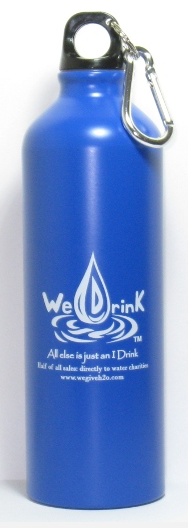 Andrew Meredith and Daniel Ebner were frustrated by the global shortage of clean water and by the lack of transparency in their cause-related purchases–t-shirts or bottled water that advertised a charitable contribution without disclosing what that cut translates to in dollars and cents. From these two pain points, Meredith and Ebner launched WeDrink, a for-profit company that sells sustainable aluminum and steel water bottles and donates precisely 50% of the purchase price to non-profits working to alleviate the world’s water crisis. WeDrink sells a 25-oz. aluminum water bottle for $18. Half of this ($9) goes directly to WeDrink’s nonprofit partner PlayPumps International to fund 10 years worth of clean drinking water for one individual.
Andrew Meredith and Daniel Ebner were frustrated by the global shortage of clean water and by the lack of transparency in their cause-related purchases–t-shirts or bottled water that advertised a charitable contribution without disclosing what that cut translates to in dollars and cents. From these two pain points, Meredith and Ebner launched WeDrink, a for-profit company that sells sustainable aluminum and steel water bottles and donates precisely 50% of the purchase price to non-profits working to alleviate the world’s water crisis. WeDrink sells a 25-oz. aluminum water bottle for $18. Half of this ($9) goes directly to WeDrink’s nonprofit partner PlayPumps International to fund 10 years worth of clean drinking water for one individual.
The up-start co-founders term their business model Collaborative-Micro Philanthropy (CMP), which aims to give buyers the opportunity to make a small donation simply by the act of their purchase. “We wanted to make the idea of a built-in donation when purchasing an item into solid business model rather than a temporary campaign,” said Meredith. While elements of CMP are extant in other campaigns (Product) RED or Ethos Water, for example, Meredith and Ebner say a CMP product must be simply transparent in the amount of money that is being donated for each purchase and that the contribution amount should be substantial, or not less than 20%.
The CMP model allows WeDrink to be transparent and easily communicate the benefit of its product to consumers. “It’s important for consumers to know exactly how much they are giving and to take pride in it,” explained Ebner. The duo cite TOMS Shoes, One Laptop Per Child and Muhammad Yunus as key influences.
Second to making waves in the crusade for clean water, Meredith and Ebner are looking to prove the efficacy of Collaborative-Micro Philanthropy and persuade other companies to become more transparent in their giving (and perhaps more generous). After all, the stakes are high when the purchase of one environmentally kind water bottle funds 10 years of clean drinking
water.





 I'm Olivia Khalili. I created Cause Capitalism to show you how to grow your business by incorporating a social mission.
I'm Olivia Khalili. I created Cause Capitalism to show you how to grow your business by incorporating a social mission. 

I give these guys props for creating WeDrink. I think their idea of partnering with nonprofits is great. However, I think that it’s dangerous to build a business model on the assumption that consumers will pay a premium for your product. Some may, but it’s a much harder sell.
Auren, that’s a good point. Data shows that consumers will pay more for products that provide an opportunity to do well. At the same time, I tend to agree with you. There are businesses who are providing this added benefit to consumers, while still providing them competitively priced products.
I appreciate your supportive words Auren, and you are right, it is a rather difficult business model.
We’ve found that for such large and transparent donations, folks are being given a chance to second-guess themselves on whether they are comfortable donating so much. Whereas a similarly priced item with an inconspicuous yet smaller donation may sell better because the consumer may be assuming this to be the market value of the product.
Efficient pricing models will eventually pin down the values for both the ideal cost of product, as well as most acceptable paired donation. But ultimately it is about pioneering and promoting the concept to other businesses so more and more consumers will become familiar and comfortable with making micro-donations on a regular basis.
Thanks again for your input, and feel free to email me personally if you wish to continue in this discussion.
-Andrew